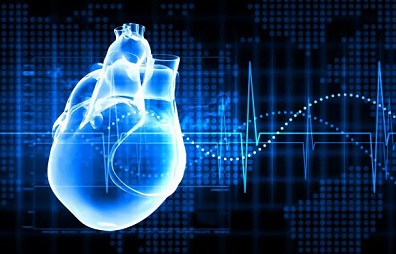AI In Medicine: Yale Scientist Develop AI Model That Can Detect Left Ventricular Systolic Dysfunction (LVSD) From ECGs Obtained By Wearable Devices
Thailand Medical News Team Aug 19, 2023 2 years, 6 months, 4 days, 21 hours, 58 minutes ago
AI In Medicine: Cardiovascular disease remains a leading cause of mortality worldwide, with heart failure being a significant contributor to this alarming statistic. Early diagnosis and intervention are pivotal in mitigating the risks associated with heart failure, yet current screening methods often fall short in accessibility and accuracy. In a groundbreaking leap forward, a team of researchers from Yale Cardiovascular Medicine and Computer Science has harnessed the power of artificial intelligence (AI) to develop an innovative model capable of detecting left ventricular systolic dysfunction (LVSD) - a precursor to heart failure - from electrocardiograms (ECGs) obtained through wearable devices.

The development and study offer a paradigm-shifting approach to leveraging AI for the early detection of cardiovascular diseases, particularly focusing on LVSD. While wearable devices hold immense potential for revolutionizing healthcare through remote monitoring and screening, their reliance on single-lead ECGs often leads to noisy data that can confound AI-based diagnostic algorithms. This challenge has been a significant roadblock in harnessing the potential of wearable technology for detecting hidden cardiovascular conditions.
To overcome this hurdle, the Yale researchers embarked on a journey to design an AI model capable of accurately detecting LVSD from noisy single-lead ECGs.
The study team undertook an extensive study involving a staggering 385,601 ECGs to develop both a standard AI model and a noise-adapted AI model. The innovation lay in their approach to training the noise-adapted model. By augmenting ECGs with custom noise patterns, mirroring real-world noise sources across four distinct frequency ranges, the study team was able to equip the model to navigate the complexities of noisy wearable device data.
In their study, both AI models demonstrated commendable performance on standard ECGs, with an impressive area under the receiver operating characteristic curve (AUROC) of 0.90. However, the true triumph of the noise-adapted model became evident when faced with wearable device noise. In this challenging scenario, the noise-adapted AI model outperformed its standard counterpart, detecting LVSD with an AUROC of 0.87 compared to 0.72. This marked improvement in performance in the presence of real-world noise sources holds transformative implications for the future of cardiovascular disease screening through wearable devices.
Historically, AI-based diagnostic algorithms have thrived in controlled clinical settings, faltering when applied to the unpredictable noise-laden environment of wearable ECG data. This disparity has impeded the progress of scalable and accurate AI-driven screening tools for cardiovascular diseases. The Yale study addresses this issue head-on by introducing a novel noise-adapted training approach. By incorporating noise patterns that simulate real-world challenges encountered in wearable ECG data, the study team has bridged the gap between clinical efficacy and real-world applicability.
The significance of this breakthrough extends beyond technological innovation. Left ventricular systolic dysfunction, if left undetected and untreated, can significantly elevate the risk of heart failure and premature mortality. The ability to identify LVSD through wearable devices presents an opportunity for early intervention and management, potent
ially transforming the lives of millions who could benefit from timely medical attention.
The implications of the Yale study are profound, ushering in a new era of
AI In Medicine driven healthcare solutions. By successfully addressing the noise-related limitations of wearable ECG data, the study team have laid the foundation for a robust, noise-agnostic AI model that can seamlessly integrate into everyday life.
This paves the way for community-wide screening programs that utilize wearable devices for comprehensive cardiovascular health monitoring.
It is important to acknowledge the study's limitations and consider the road ahead. While the noise-adapted model demonstrated remarkable performance across diverse demographics, the researchers acknowledge the need for prospective assessments in real-world screening scenarios. Additionally, variations in LV systolic dysfunction severity and the impact of different noise signatures on model performance warrant further investigation.
In conclusion, the Yale scientists' achievement represents a significant leap towards democratizing healthcare through AI and wearable technology. By conquering the challenge of noise-laden data, they have forged a path towards accurate and scalable AI-driven screening for cardiovascular diseases. This advancement not only promises early detection of LVSD but also sets the stage for a future where wearable devices serve as vital tools in safeguarding cardiovascular health across communities and populations.
The study findings were published in the peer reviewed journal: NPJ Digital Medicine.
https://www.nature.com/articles/s41746-023-00869-w
For the latest about
AI In Medicine, keep on logging to Thailand Medical News.
